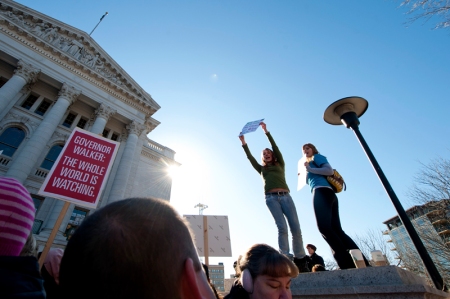
Jonas and I spent our Saturday in Madison to lend our voices to the movement against Governor Scott Walker’s attempt to destroy Wisconsin public-employee unions. We both found the experience empowering and inspiring; here are a few scattered thoughts I find worth sharing.
First: this movement is not marginal. Much of my experience with social movements comes from the so-called “anti-globalization” movement that peaked in the United States in 1999-2001, and from the anti-war movement that began building after 9/11. Both of those movements involved mass protests that combined “regular” middle- and working-class folks with privileged young activists, fringe lefties, black bloc anarchists, and a smattering of incomprehensible crazies. Without doubt, the “regular” folks and young activists were the vast majorities, but their voices were too often drowned out by the rest, particularly at large protest events.
This one is different. This protest features all your typical assortment of working-class families you might find at a labor rally, plus tons of teachers, their families, and their students; university student activists; and mainstream Wisconsin Democrats. On Saturday, there was some inevitable message creep, but by and large, the speakers, signs, and discourse was all right on message: decrying Walker’s bill as an attack on essential workers’ rights.
Second, the solidarity exhibited is heartening. It has never been clearer to me that the labor movement is the closest thing the United States has to any kind of (working-)class consciousness. It’s not just public-employee union members that are speaking out here; there were tons of private-sector unions on hand on Saturday, not to mention plenty of “Cops For Labor” and “Firefighters For Labor” – representatives of the very public unions that Walker’s bill treats very differently for crass political reasons. Further, there were representatives from many geographic areas other than Wisconsin, and numerous speakers who took the bullhorn briefly just to say, “I’m not from Wisconsin, I’m not a union member, but I’m here to support you because what’s happening here is wrong.”
Third, the messaging is well-controlled. There was only one sign Jonas and I saw that hinted at the potentially damaging effects of guild-unionism (or occupational licensing), something along the lines of, “I’m not replaceable, I’m a professional.” This raises some troubling rifts between skilled and unskilled workers, differentiating professional work as somehow more worthy of protection compared to less-skilled work. This, of course, is the modus operandi of the structure of the global economy, which places low-wage unskilled work at the mercies of global competition while developing new structures to protect those in high-wage skilled work.
That one sign aside, for the most part, all the words and speeches emphasized the importance of unions as a source of power for working people as a whole – not as a source of power for some segments of the workers to use against other segments of the same. Also, there was a very useful emphasis on the fact that unions are important not just for wage bargaining, but also as a source of worker voice: “Take my money, but don’t take my voice” was one of my favorite signs.
Fourth, and least consequential, the Wisconsin Capitol is incredibly accessible. We had some inkling of this when we visited the Capitol building last year, but we were still surprised by the fact that throngs of protesters were freely let into the building without any kind of security checks, and allowed to congregate in the middle of the rotunda, chanting and singing and screaming and beating drums and playing brass instruments and plastering signs all over the walls (albeit only using painter’s tape). The treatment of this building as a truly public space was inspirational, particularly given my only other experience with government buildings – at the federal level in D.C., where things are handled rather differently to say the least. This is certainly not to imply that the federal government should treat its buildings the way Wisconsin treats its Capitol; but nevertheless, the contrast was incredibly stark.
Some more of my photos from both inside the Capitol and outside are after the jump. The rallies outside were larger by orders of magnitude than the occupation inside (I’ve seen estimates of 60,000 outside versus a few thousand inside), but most of my photos are from the inside event, as those are what we tended to find most inspirational. Click on any photo to view a larger version.
For some excellent video of the protests over the past six days, check out Matt Wisniewski’s work – five minutes of impeccably filmed and edited footage from Feb. 15-17, and five more from Feb. 18-19.
Flying Whale
Read the rest of this entry ?
 I don’t mean to suggest that the domestic and international protests are completely unrelated. Flying Whale and I have talked offline about whether or not a global working class consciousness is on the verge of (re-)emerging. And this sign from an Egyptian man certainly provide some reason for hope.
I don’t mean to suggest that the domestic and international protests are completely unrelated. Flying Whale and I have talked offline about whether or not a global working class consciousness is on the verge of (re-)emerging. And this sign from an Egyptian man certainly provide some reason for hope.


